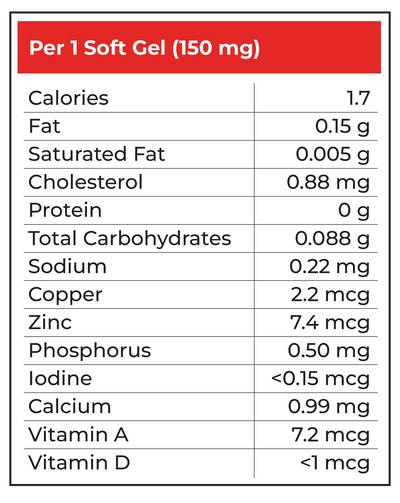Clinical Studies
Tools for Your Practice!
FAQs for Vets
Ingredients
Antinol Plus is manufactured in the USA from globally sourced ingredients. It is made with green-lipped mussels that are sustainably sourced from New Zealand and Antarctic Krill which is sourced from the nutrient-dense waters around Antarctica. Additionally, olive oil is sourced from Spain, gelatin is sourced from the USA, Vitamin E (D-alpha-tocopherol) is sourced from Argentina, glycerin is sourced from Indonesia and sorbitol is sourced from Mexico.
See the table below for the nutritional analysis:

The soft gel capsules of Antinol Plus are made of bovine gelatin.
The ingredients in Antinol Plus are human grade. We follow the same standards as human supplements.
Distillation refers to the process that utilizes heat to vaporize and separate compounds based on their boiling points, which can damage sensitive active compounds. We do not use a distillation process, but rather a supercritical CO2 extraction process. CO2 extraction utilizes high pressure with lower temperatures to extract desired sensitive compounds while preserving their activity.
About the Product
Antinol Plus is third-party tested and crafted under strict manufacturing standards and proudly bears the NASC Quality Seal.
Antinol Plus is superior to traditional fish oil supplements because it delivers powerful joint and mobility support in a much smaller, more potent dose. Unlike many fish oil products, Antinol Plus is clinically studied, with studies proving its effectiveness in improving mobility in as little as 30 days. Its ingredient purity and transparency ensure that what you buy is exactly what was studied, a standard seldom met by fish oil supplements.
Safety
We are not aware of side effects of this product when used as suggested.
Historically, omega-3 fatty acids consumed in the form of fish oil supplements were thought to be associated with increased bleeding risk due to the anti-platelet activity of EPA and DHA. While this concern persists in practice, evidence gleaned from newer research has shown that omega-3 supplementation and increasing omega-3 plasma levels are actually associated with lower bleeding risk.
References:
References
1. Kapoor K, Alfaddagh A, Al Rifai M, et al. Association Between Omega-3 Fatty Acid Levels and Risk for Incident Major Bleeding
Events and Atrial Fibrillation: MESA. J Am Heart Assoc. 2021;10(11):e021431.
2. Akintoye E, Sethi P, Harris WS, et al. Fish Oil and Perioperative Bleeding. Circ Cardiovasc Qual Outcomes 2018;11(11):e004584.
3. Begtrup KM, Krag AE, Hvas AM. No impact of fish oil supplements on bleeding risk: a systematic review. Dan Med J. 2017;64(5).
4. Wachira JK, Larson MK, Harris WS. n-3 Fatty acids affect haemostasis but do not increase the risk of bleeding: clinical
observations and mechanistic insights. Br J Nutr. 2014;111(9):1652-1662.
We include sorbitol in Antinol Plus to help make sure the soft gel capsules are sealed properly. This is important to ensure that the product is of high quality. Sorbitol is commonly used in the industry because it works well with krill.
Sorbitol is a safe and non-toxic excipient that is used in many supplements. In dogs, several studies have shown that doses of up to 20% sorbitol in dog food had no effect on overall health.
To put this into perspective, for a dog that weighs 20 lbs., 7.2% sorbitol in diet would equate to a daily intake of about 22 grams of sorbitol. Antinol Plus has 0.0007 grams of sorbitol per soft gel.
If you prefer to avoid sorbitol all together, the contents of the Antinol Plus soft gels may be emptied onto the pet’s food, since sorbitol is only present in the soft gel shell.
Yes, Antinol Plus can be used long-term when used as suggested.
Veterinary Support
Yes, we do! Please visit the "Tools for Your Practice" section on our website to download trifold brochures, technical bulletins, and other educational resources.



